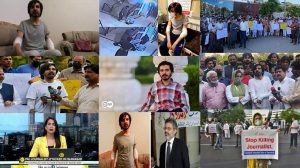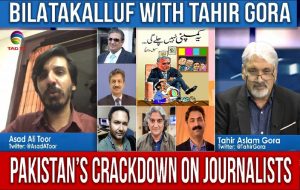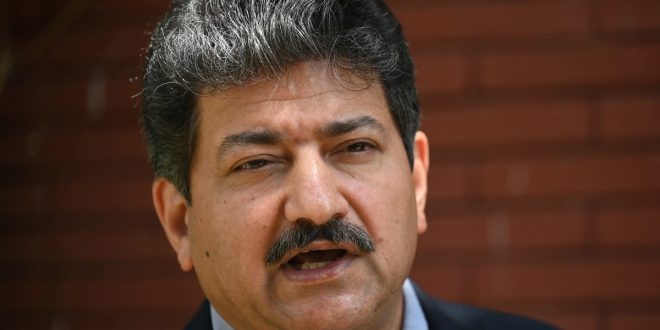31-05-2021
By SJA Jafri + Bureau Report + Agencies
ISLAMABAD/ KARACHI: Prominent Pakistani journalist Hamid Mir has been taken off the air just days after he spoke out against the country’s military at a protest against an attack on another journalist.
Mir told Al Jazeera he has been informed he will not be hosting “Capital Talk” on Geo News from Monday evening.
“I’ve only been told by Geo management that I won’t be hosting the show,” Mir said.
“They said there is a lot of pressure [after the statements at the protest last week]. They did not say who it is coming from.”
 With specifying a reason for the move, Geo News’s management confirmed to Al Jazeera that Mir had been taken off-air and would not be hosting the show.
With specifying a reason for the move, Geo News’s management confirmed to Al Jazeera that Mir had been taken off-air and would not be hosting the show.
Informed sources told Al Jazeera that Geo News had been “pressured to fire [Mir]”.
Last week, independent Pakistani journalist Asad Ali Toor, known for his critical coverage of the country’s government and military, was attacked in his Islamabad home by three unidentified men, who beat him up and warned him about his work.
In his speech at the protest against the attack in Islamabad on Friday, Mir had threatened to identify those responsible for a spate of recent attacks on journalists in Pakistan. He used several terms implying the involvement of the Pakistani military and named Pakistani army chief General Qamar Javed Bajwa.
“If you’re breaking into our homes to assault us, well, we cannot enter your homes as you have tanks and guns, but we can make things public, things from inside your homes,” Mir said at the protest, alluding to the military’s involvement.
In 2014, Mir survived a shooting attack by unidentified attackers shortly after he hosted an episode of his program that focused on alleged rights violations by the military in the southwestern Balochistan province.
“The space is completely shrinking. In fact, I’d say it is finishing. You are not even allowed to express yourself while you are not on duty,” said Iqbal Khattak, Reporters Without Borders (RSF) representative in Pakistan and head of media rights group Freedom Network, in response to Mir being taken off-air.
“I think we were proven right that the state and the government are putting pressure to influence the editorial independence of certain media houses.”
 Khattak said the threats against journalists specifically targeted those who reported in a critical manner on the government and the military.
Khattak said the threats against journalists specifically targeted those who reported in a critical manner on the government and the military.
“Journalists who are critical of the government policies are under pressure, and those who are saying that ‘everything is fine’, they have no issues as far as their security and safety are concerned.”
ISI’s involvement
Toor, who was attacked on Wednesday, said in a police report that one of his attackers identified himself as belonging to the Inter-Services Intelligence (ISI), the country’s main intelligence agency.
On Saturday, the Pakistan government termed the accusation “a well-thought-out conspiracy”.
Pakistan’s military has directly ruled the country for roughly half of its 74-year history, and critics say it continues to exercise control over many aspects of Prime Minister Imran Khan’s government.
In 2019, an Al-Jazeera investigation found that journalists, editors and managers at news organizations across the country reported their work was being censored by the government and the military through the targeting of their news organizations using financial means.
In July 2020, prominent television news host Matiullah Jan was abducted from outside a school in Islamabad. Jan said he was blindfolded, gagged, bound and assaulted by the unidentified attackers during 12 hours in custody.
 In April, senior journalist Absar Alam was shot in the abdomen while he was out for a walk in Islamabad. Alam survived the attack, with a lone attacker seen on security camera footage fleeing the scene.
In April, senior journalist Absar Alam was shot in the abdomen while he was out for a walk in Islamabad. Alam survived the attack, with a lone attacker seen on security camera footage fleeing the scene.
No arrests have been made in either case.
In January, the BBC was forced to stop broadcasting a daily Urdu news bulletin due to “interference” in its editorial content.
“The Pakistani media, which have a long tradition of being very lively, have become a priority target for the country’s ‘deep state’, a euphemism for the military and ISI … and the significant degree of control they exercise over the civilian executive,” says media rights watchdog RSF.
“The influence of this military ‘establishment’, which cannot stand independent journalism, has increased dramatically since Imran Khan became prime minister in July 2018.”
Pakistan ranks ninth on the Committee to Protect Journalists’ Global Impunity Index, with at least 15 unsolved murders of journalists.
In 2021, the country was ranked 145 out of 180 countries on RSF’s World Press Freedom Index.
The government denies involvement in attacks against journalists or press censorship, with PM Khan frequently repeating his claim that media in Pakistan are independent.
Pakistani Information Minister Fawad Chaudhry did not respond to an Al Jazeera request for comment, but last week denied the existence of press censorship in the country while also accusing journalists of fabricating attack claims “to get immigration” to other countries.
 Pressmediaofindia
Pressmediaofindia




